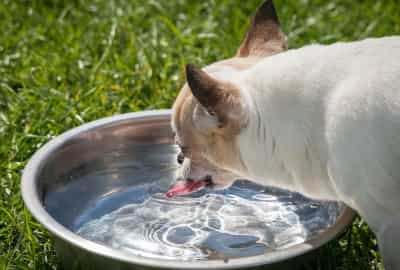Symptoms of Dog Bladder Infection
The symptoms of a dog bladder infection can be quite miserable for your pet so we're going to cut to the chase and give you a check list of how to know if your dog has a bladder infection.

The sooner the problem is identified the sooner the treatment of the symptoms can be started to restore your dog to a happier state of wellness.
So here goes...
Symptoms of Dog Bladder Infection - Check List
- Your dog may appear to be straining to urinate and sometimes cry from the pain he is feeling.
- Your dog may be straining to urinate but nothing comes out. A serious symptom.
- Your dog has an urge to urinate more often, but only a small amount of cloudy-looking urine is passed.
- Your pet may be lethargic and have a lack of appetite.
- You may see some blood in the urine, plus it may have a bad odor.
- Your pet is more thirsty than normal.
- You may see your pet licking his/her genital area to relieve the stinging sensation they are feeling.
If the symptoms of a bladder infection include signs of pain that persist, this is the most significant reason to call your vet for advice.
If fever is present, it may indicate a kidney problem, also very serious.
Symptoms of dog bladder infections often get the attention of a pet parent when
their normally reliable potty-trained dog starts leaving little puddles
around the house, or wants to go outside to urinate more frequently.
What Causes A Dog Bladder Infection
Although it isn't apparent, the microscopic culprits usually responsible for this condition are bacteria, frequently of the E. coli type Some other types that may be involved are staphylcoccus, streptococcus, and proteus
Once bacteria gets into the urinary system the stage is set for an infection. The resulting UTI (urinary tract infection) can cause a dog to experience irritation of the urethra (the tube that carries urine to the outside), plus a burning sensation when they urinate.
This can be quite painful for them to the degree that some dogs will actually cry from the discomfort.

Sources of Bacteria
One way bacteria can get into your dog's urinary tract is through his water bowl, so it is important to change his water often to ensure that it is as fresh as possible.
If you local water is not of good quality, a filtered water bowl is
a good option. You might even want to
consider a water purification system for the benefit of your entire family.
In addition, sanitize your dog's water bowl
when you refresh his water supply to destroy any bacteria that may be
present. Plus try to keep your dog away from drinking the water in
puddles, streams and ponds where pollution is more likely to occur.
Diet and Dog Bladder Infections
When it comes to health related problems, an important area to examine is a dog's diet. If your dog isn't getting a well-balanced natural diet, he will likely be more prone to bladder infections.
The reason for this is that the chemicals and toxic additives found in popular processed dog food, can alter the ph in the urinary tract making it easier for bacteria to grow and multiply.
Bacteria may be invisible to the naked eye but they are persistent little devils and if they get the upper hand, they can weaken your dog's immune system.
Dog Bladder Infection Treatment
Antibiotics are widely prescribed by vets to treat a number of common dog illnesses including the symptoms of dog bladder infection.
While these drugs have certainly proven
to be effective, some experts believe they can also have adverse side
effects when used too often to treat an illness.
Pet owners who share this belief often opt to ask their vets about trying
homeopathic or other natural remedies before considering the use of conventional
drug therapies.
Dr. Pitcairn, the highly respected author of Natural Health For Dogs And Cats, is an advocate of using both natural and homeopathic approaches when appropriate, as they are designed to be preventative approaches as opposed to just treating symptoms.
Some things to remember...
- Whenever your dog is having problems with urination,
a visit to the vet is in order to get an accurate diagnosis and discuss the treatment
options.
- There is always the possibility that symptoms could indicate the presence of bladder stones, or the crystals that can turn into stones.
- There may even be an obstruction in the urinary tract which is very serious and needs quick attention.
- On the home front, make sure your dog has plenty of fresh water available as this will help flush out the bacteria.
- Let your dog outside frequently and take her on walks to stimulate the bladder so she has plenty of opportunities to urinate.
- Many vets suggest giving a small amount of citrus juice daily. This is to make the urine more acidic and less friendly to bacteria and to provide some relief when urination is causing pain.
Prevention Tips
- Make sure your dog is receiving a natural diet containing a proper balance of proteins, fats and carbohydrates, as the ideal.
- In my view, nothing can influence a dog's long term health and immunity to disease more than eating wholesome food.
If your dog has frequent health related issues, make sure his food is free of chemicals. Take a look at this page for some dietary options.
- Provide daily supplements to strengthen his urinary tract, including: a B Complex formula, cod liver oil, buffered vitamin C and vitamin E. Ask your vet about the appropriate amounts your pet should receive.
Bladder infections in dogs are just one of many illnesses that can crop up during your pet's lifetime.
To become a more informed dog owner when it comes to recognizing the symptoms of dog bladder infections and various other pet health conditions, Dr. Pitcairn's book mentioned above, is a valuable resource.
His book contains information about numerous dog health issues, useful home remedies, plus advice about which illnesses need a consultation with a veterinary professional.
Good luck and keep 'em healthy!
Health Related Pages
